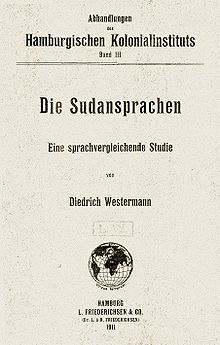
Diedrich Hermann Westermann
Encyclopedia

Germany
Germany , officially the Federal Republic of Germany , is a federal parliamentary republic in Europe. The country consists of 16 states while the capital and largest city is Berlin. Germany covers an area of 357,021 km2 and has a largely temperate seasonal climate...
missionary, Africanist
Africanist
Africanist may refer to:*A specialist in African studies*A strand of African nationalism during the activism against apartheid in South Africa particularly associated with the Pan Africanist Congress...
, and linguist
Linguistics
Linguistics is the scientific study of human language. Linguistics can be broadly broken into three categories or subfields of study: language form, language meaning, and language in context....
. He substantially extended and revised the work of Carl Meinhof
Carl Meinhof
Carl Friedrich Michael Meinhof was a German linguist and one of the first linguists to study African languages.-Early years and career:...
, his teacher, although he rejected some of Meinhof's theories only implicitly. Westermann is seen as one of the founders of modern Africa
Africa
Africa is the world's second largest and second most populous continent, after Asia. At about 30.2 million km² including adjacent islands, it covers 6% of the Earth's total surface area and 20.4% of the total land area...
n linguistics.
He carried out extensive linguistic and anthropological research in the area ranging from Senegal eastwards to the Upper Nile. His linguistic publications cover a wide range of African languages, including the Gbe languages
Gbe languages
The Gbe languages form a cluster of about twenty related languages stretching across the area between eastern Ghana and western Nigeria. The total number of speakers of Gbe languages is between four and eight million. The most widely spoken Gbe language is Ewe , followed by Fon...
, Nuer
Nuer language
The Nuer language is a Nilo-Saharan language of the Western Nilotic group. It is spoken by the Nuer people of South Sudan and in western Ethiopia. Nuer is one of eastern and central Africa's most widely spoken languages. The Nuer nation is one of the largest in South Sudan.Nuer language has a...
, Kpelle
Kpelle language
The Kpelle language is spoken by the Kpelle people and is part of the Mande family of languages. Guinean Kpelle [gkp] , spoken by half a million people, concentrated primarily, but not exclusively, in the forest regions of Guinea, whose capital, Nzérékoré, is the third largest city in Guinea and...
, Shilluk
Shilluk language
The Shilluk Language, or Chollo, is a Nilotic language spoken by the Shilluk people of South Sudan. It is closely related to Luo. Dhɔg Cɔllɔ is widely spoken throughout the Shilluk Kingdom and it is the official language of Shilluk and the residents in Shilluk Kingdom.-Written language:Tyɛlli...
, Hausa
Hausa language
Hausa is the Chadic language with the largest number of speakers, spoken as a first language by about 25 million people, and as a second language by about 18 million more, an approximate total of 43 million people...
, and Guang.
Westermann's comparative work, begun in 1911, initially brought together much of today's Niger–Congo and Nilo-Saharan language phyla under the name Sudanic languages
Sudanic languages
In early twentieth century classification of African languages, Sudanic languages was a generic term for African languages spoken in the Sahel belt from Ethiopia in the east to Senegal in the west.-Scope:...
. His most important later publication Die westlichen Sudansprachen 1927a divided these into East and West Sudanic languages
Sudanic languages
In early twentieth century classification of African languages, Sudanic languages was a generic term for African languages spoken in the Sahel belt from Ethiopia in the east to Senegal in the west.-Scope:...
and laid the basis for what would become Niger–Congo. In this book and a series of associated articles between 1925 and 1928, Westermann both identified a large number of roots that form the basis of our understanding of Niger–Congo and set out the evidence for the coherence of many of the families that constitute it. Much of the classification of African languages associated with Joseph Greenberg actually derives from the work of Westermann.
In 1927 Westermann published a Practical Orthography of African Languages
African languages
There are over 2100 and by some counts over 3000 languages spoken natively in Africa in several major language families:*Afro-Asiatic spread throughout the Middle East, North Africa, the Horn of Africa, and parts of the Sahel...
which became later known as the Westermann script. Subsequently he published the influential and oft-reprinted Practical Phonetics for Students of African Languages in collaboration with Ida C. Ward
Ida C. Ward
Ida Caroline Ward was a British linguist working mainly on African languages who did influential work in the domains of phonology and tonology. Her 1933 collaboration with Diedrich Hermann Westermann, Practical Phonetics for Students of African languages, was reprinted many times...
(1933).
He was born in Baden
Baden, Lower Saxony
Baden is a town near Bremen, in Lower Saxony, Germany. It is known to Africanists and Phoneticians as the place where Diedrich Hermann Westermann was born and died.Baden is a borough of the town of Achim....
near Bremen and also died there.

